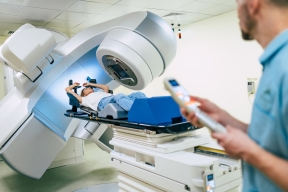Advances in Breast Cancer Treatment and Survival
From an interview with
Dr. Jamie Smith
McLeod Oncology and Hematology Associates
Researchers around the world are working to advance our understanding of how to prevent, detect, and treat breast cancer. The mainstays of breast cancer treatment are surgery, radiation, chemotherapy, hormone therapy, and targeted therapy. But scientists continue to study novel treatments and drugs, along with new combinations of existing treatments. McLeod oncologist Dr. Jamie Smith explains how treatment options continue to evolve to fit the medical needs of each unique patient.
“At McLeod, our goal is to provide personalized breast cancer care. One treatment does not fit all, so we individualize a plan to each and every patient’s needs. Breast cancer research continues to move forward with multiple advancements in care.
Today, we have more chemotherapy agents and targeted treatments to help women than ever before. We now understand there are very specific pathways cancer cells navigate for their survival. This research has led to the development of drugs that can block parts of those pathways and suppress cancer.
We also have immunotherapy available, which arms the body’s immune system to attack cancer cells. This form of therapy helps the immune system recognize the cancer, then stimulate an intense response against the tumor.
As research of breast cancer continues, these discoveries will help guide treatment in the future and improve survival.”
Women in the United States get breast cancer more than any other type of cancer except for skin cancer. However, breast cancer is one of a few cancers for which an effective screening test, mammography, is available. The purpose of screening is to look for signs of the disease before a person has any symptoms. The goal of screening tests is to find cancer at an early stage, when it can be treated and may be cured.
To learn more, speak with an oncologist near you.
-
McLEOD REGIONAL MEDICAL CENTER FLORENCE
843-777-2000 -
McLEOD DARLINGTON
843-777-1100 -
McLEOD DILLON
843-774-4111 -
McLEOD LORIS
843-716-7000 -
McLEOD SEACOAST
843-390-8100 -
McLEOD CHERAW
843-537-7881 -
McLEOD CLARENDON
803-433-3000



-
McLEOD REGIONAL MEDICAL CENTER FLORENCE
843-777-2000 -
McLEOD DARLINGTON
843-777-1100 -
McLEOD DILLON
843-774-4111 -
McLEOD LORIS
843-716-7000 -
McLEOD SEACOAST
843-390-8100 -
McLEOD CHERAW
843-537-7881 -
McLEOD CLARENDON
803-433-3000
 Find a Doctor
Find a Doctor  Locations
Locations  Services
Services 